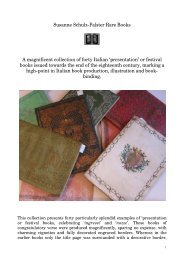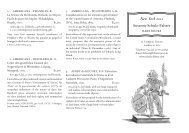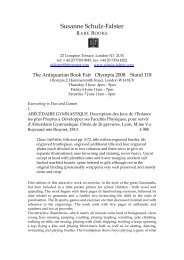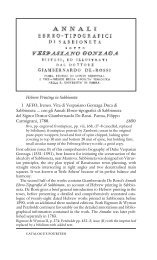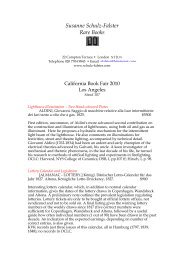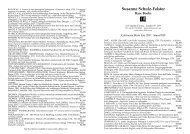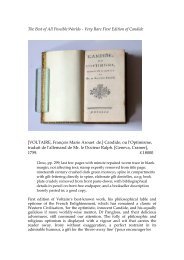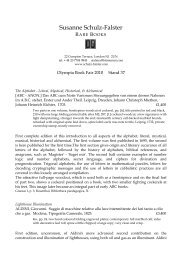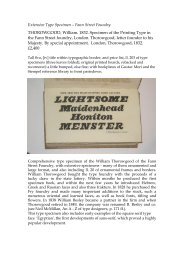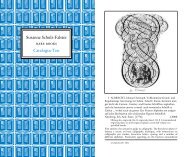«Merge Record #»«Title» - Susanne Schulz-Falster
«Merge Record #»«Title» - Susanne Schulz-Falster
«Merge Record #»«Title» - Susanne Schulz-Falster
You also want an ePaper? Increase the reach of your titles
YUMPU automatically turns print PDFs into web optimized ePapers that Google loves.
First edition of Stirner's influential and highly original main work, his proclamation of<br />
individualistic anarchy which placed him in the tradition of Godwin, and exerted<br />
considerable influence over the modern school of anarchists in Germany and Russia.<br />
Max Stirner is frequently cited as one of the earlierst and best-known exponents of<br />
individual anarchism, becausse of his rejection of the state, law, and government. His<br />
The Ego and Its Own (sometimes translated as 'The Individual and His Property') is<br />
considered to be 'a founding text in the tradition of individualist anarchism.'Stirner<br />
maintained that society had no responsibility for its members, and that many generally<br />
accepted notions, such as the concept of the state, property as a right, natural rights, and<br />
the very notion of society were mere illusions or ghosts in the mind, saying of society<br />
that 'the individuals are its reality'. He advocated egoism and a form of amoralism, in<br />
which individuals would unite in 'associations of egoists' only when it was in their self<br />
interest to do so. For him, property simply comes about through might: 'Whoever knows<br />
how to take, to defend, the thing, to him belongs property.' And, 'What I have in my<br />
power, that is my own. So long as I assert myself as holder, I am the proprietor of the<br />
thing.'<br />
His ideas influenced many anarchists, although interpretations of his thought are diverse,<br />
and one of his most prominent disciples was the American anarchist Benjamin Tucker.<br />
Stammhammer I, 241; Borst 2187; Menger c. 368.<br />
The Delights of Conjugal Love<br />
72.<br />
SWEDENBORG, Emanuel. Traité curieux des charmes de l'amour conjugal dans ce<br />
monde et dans l'autre. … traduit du Latin en Français par M. de Brumore. Berlin and<br />
Basle, George-Jacques & J. Henri Decker, 1784. $1200<br />
12mo, pp. [iv], 206; some spotting and browning at beginning and end, due to paper quality;<br />
contemporary calf-backed pastepaper boards, spine gilt, gilt-lettered spine label, with armorial<br />
bookplate with monogram CIVLR and motto 'Mors est vita sine literis' to verso of front free<br />
endpaper.<br />
First French translation of Swedenborg's well-known work on the delights of marriage,<br />
which first appeared in Latin under the title Deliciae sapientiae de amore coniugalis in<br />
1768. Swedenborg regarded marriage as the union between wisdom, embodied in the<br />
man, and love, embodied in the woman. Thus marriage is a union between the two<br />
qualities of reason and intention, a dualism that can be traced throughout his writings.<br />
The Swedish scientist and philosopher Swedenborg (1688-1772) is now best known for<br />
the spiritualist movement he founded, which exerted great influence on a wide range of<br />
artists, writers and philosophers, such as William Blake, Strindberg, Baudelaire, W.B.<br />
Yeats, Carl Jung and William James to mention but a few.<br />
Cioranescu 33411; OCLC lists copies at the Dutch Royal Library, Cornell, Wellcome Library, Graduate<br />
Union College, California.<br />
Theatre, Dance and Gambling Condemned<br />
73.



